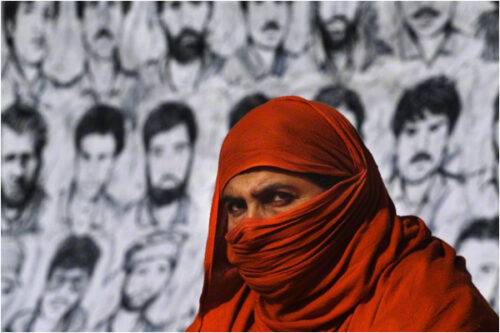
"Enforced disappearances in Pakistan have become a routine occurrence," the Asian Human Rights Commission said on Tuesday.
Authorities have accepted this as standard law enforcement practice, the commission said in a statement released on the occasion of the International Day of the Victims of Enforced Disappearances. The AHRC said both, the government and judiciary were cognisant of how prevalent enforced disappearances had become. The practice, the commission said, was perpetuated by the military and intelligence agencies. Rampant, the AHRC said, the practice had become in Balochistan.
Pakistan's failure to introduce new legislation or implement existing laws to curb the practice or nab perpetrators stood contrary to the nation's international obligations.
The AHRC claimed over 8,000 individuals -- doctors, political workers, journalists, rights activists, lawyers and students had been reported missing after being nabbed by Pakistani forces. More than 100 Sindhi nationalists have been arrested. Dozens have been extra-judicially killed, the commission said. Over 2,000 affiliated with religious organisations have 'disappeared'.
Pakistan ranks amongst the highest in the world in connection with incidence of enforced disappearances. Hotspots include the restive Khyber-Pakhtunkhwa (K-P), Balochistan and Azad Jammu and Kashmir. The commission urged Pakistan to ratify the International Convention for the Protection of all Persons from Enforced Disappearance and introduce legislation to eradicate the practice.
In a separate statement, the Human Rights Commission of Pakistan (HRCP) called on all civil society stakeholders to be consulted over the Criminal Law (Amendment) Bill 2022 Senate Deliberations. The commission also called for civilian oversight over forces routinely blamed for enforced disappearances.
The HRCP too, called for Pakistan to ratify the International Convention for the Protection of all Persons from Enforced Disappearance. The commission also demanded the immediate release of Karachi-based published and writer Faheem Baloch.
Journalist-researcher Rabia Mehmood spoke to rights activist Sammi Baluch and academic Mahvish Ahmad on Naya Daur - The Friday Times to mark the day. Topics covered included state violence, the War on Terror, rights abuse and disappearances as policy.
https://www.youtube.com/watch?v=3AAHb9vGX7o
Authorities have accepted this as standard law enforcement practice, the commission said in a statement released on the occasion of the International Day of the Victims of Enforced Disappearances. The AHRC said both, the government and judiciary were cognisant of how prevalent enforced disappearances had become. The practice, the commission said, was perpetuated by the military and intelligence agencies. Rampant, the AHRC said, the practice had become in Balochistan.
Pakistan's failure to introduce new legislation or implement existing laws to curb the practice or nab perpetrators stood contrary to the nation's international obligations.
The AHRC claimed over 8,000 individuals -- doctors, political workers, journalists, rights activists, lawyers and students had been reported missing after being nabbed by Pakistani forces. More than 100 Sindhi nationalists have been arrested. Dozens have been extra-judicially killed, the commission said. Over 2,000 affiliated with religious organisations have 'disappeared'.
Pakistan ranks amongst the highest in the world in connection with incidence of enforced disappearances. Hotspots include the restive Khyber-Pakhtunkhwa (K-P), Balochistan and Azad Jammu and Kashmir. The commission urged Pakistan to ratify the International Convention for the Protection of all Persons from Enforced Disappearance and introduce legislation to eradicate the practice.
In a separate statement, the Human Rights Commission of Pakistan (HRCP) called on all civil society stakeholders to be consulted over the Criminal Law (Amendment) Bill 2022 Senate Deliberations. The commission also called for civilian oversight over forces routinely blamed for enforced disappearances.
The HRCP too, called for Pakistan to ratify the International Convention for the Protection of all Persons from Enforced Disappearance. The commission also demanded the immediate release of Karachi-based published and writer Faheem Baloch.
Journalist-researcher Rabia Mehmood spoke to rights activist Sammi Baluch and academic Mahvish Ahmad on Naya Daur - The Friday Times to mark the day. Topics covered included state violence, the War on Terror, rights abuse and disappearances as policy.
https://www.youtube.com/watch?v=3AAHb9vGX7o

